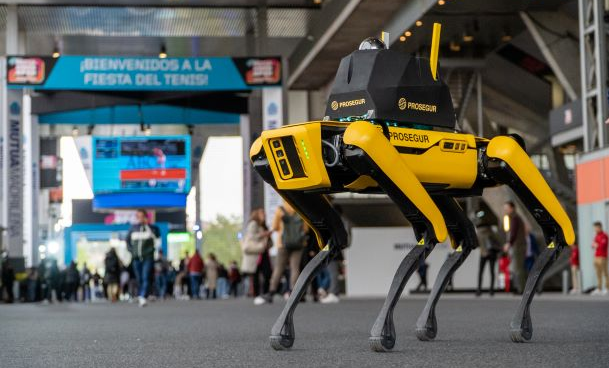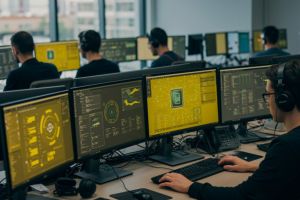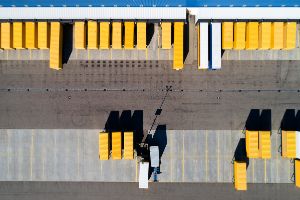Mutua Madrid Open: This is how a major sporting event is protected today

Perhaps the most famous incident in the history of tennis occurred on 30 April 1993 when, during the quarter finals of the Hamburg tournament, a spectator stormed onto the court brandishing a kitchen knife and attacked Serbian tennis player Monica Seles, who was then world number one at the age of 19.
Seles reacted with astonishment. This was happening in the decisive rounds of an elite tournament broadcast on television to half the world's population. Looking at the images, it seems that everything is happening in slow motion, given the strange passivity of the (few) staff responsible for protecting the court. The only somewhat belated reaction comes from Seles's bodyguard, who intercepts and disarms the intruder.
It was an occurrence that transformed tennis. As Tom Kleim, event director for the brand that sponsored the women's circuit, recounted years later, "back then, only tournaments like Wimbledon or Roland Garros had top-notch security operations." Others, like the one in Hamburg, "relied on a decades-old tradition in which everything had gone smoothly." Tennis was still a sport where "fans could routinely come within a metre of super-elite athletes and no one saw any particular risk in them doing so". The worst nightmare for security officials was bomb threats, which were often false, but meant the court had to be vacated.
That has changed. There has been a marked increase in potential threats to elite-level sport since the 1990s. But security measures have also been stepped up, and to an even greater extent. Resources are greater, there is more experience to call on and professional standards are higher. And, in recent years in particular, and in a development which is crucial for the private protection sector, technology has increased (and improved).
Innovation in its DNA
Prosegur is currently responsible for ensuring the security of the Mutua Madrid Open. As Luis Asunción, Prosegur Security's Sales and Marketing Director, explains, the company is doing this with a protection plan that is "robust, innovative and tailored to the needs of an elite-level event". And the goal is in no way trivial: this is an event that will bring together some of the best players in the world and the aim is to ensure that it passes without incident and that the 300.000 people who will attend the Caja Mágica until Sunday 8 May "feel comfortable and sufficiently at ease to enjoy the tournament without any concerns.
As Asunción recalls, "for this type of gathering, cooperation between private security and state security forces and bodies is essential", which is why Prosegur assumes control of what happens inside the venue, "divided into three security rings", and the authorities "are responsible for the exterior access points and security". The private security plan includes the deployment of 200 professionals, further strengthened by "a significant technological deployment".
And this is where Yellow comes in, a robot dog endowed with artificial intelligence that is part of the Prosegur device. Yellow, named after the corporate colour of Prosegur, is the mechanical equivalent of that noble lineage of guard dogs that have been used to protect homes, crops and livestock since the Neolithic Era. That it is a dog is a nod to that long-established and proud tradition of surveillance, but no German shepherd has ever been able to match what Yellow does today.
Endowed with significant video analytics capabilities thanks to the use of the GenzAI technology platform, this canine robot collects data from its environment that enable it to detect suspicious elements, recognise them and, if necessary, alert the Prosegur Security Centre (SOC) . Yellow is an agile and versatile robot, "which runs autonomously for 90 minutes and can carry up to 14 kilos", as Asunción explains. It can independently carry out security patrols at night, walk the perimeter supervised by Prosegur personnel during matches with spectators and even act as a security guard and VIP assistant, accompanying the players during training sessions. It climbs stairs, avoids obstacles and moves smoothly over uneven terrain. Just like a dog. And it comes equipped with a capacity for observation, interpretation and analysis unprecedented in the canine race.
I robot
Gerard Tsobanian, CEO & President of the Mutua Madrid Open, provides a very satisfactory appraisal both of the presence of Yellow and the cutting-edge operation designed by Prosegur: "We are delighted to be associated with this project, because it perfectly defines the technological and innovative character that is in the DNA of the Mutua Madrid Open". According to José Gil, Managing Director of Prosegur Security in Iberia, tennis, like any other competitive sport played in mass access venues, must incorporate "the most advanced technologies" into its security, those that enable it to "instantly detect incidents and take appropriate action, even anticipating potential risks".
This explains Prosegur's effort to expand its arsenal of protection tools by making creative use of cutting-edge technologies such as artificial intelligence or the Internet of Things, thus establishing a cutting-edge hybrid security platform. In the words of José Daniel Espinel, Global Director of Innovation and Product Development for Security at Prosegur, it is about "providing our security guards with technological superpowers that allow them to protect us more and better".
Yellow is part of those superpowers. Luis Asunción explains that the robot can, for example, "autonomously approach and supervise a suspicious element, thus avoiding a potential risk for the guards." The recruitment of such an efficient new asset, a worthy representative of "the most advanced robotics at present", represents, as Asunción explains, "added value to the customer in terms of hybrid security, since it is capable of optimising and integrating traditional resources such as security guards or cameras equipped with the best state-of-the-art technology so that the entire security device is more efficiently supervised by the control centre".
Yellow further enhances a deep and constructive professional relationship between Prosegur and Mutua Madrid Open: "They have been putting their trust in us for 20 years, since the 2002 edition to be precise, and for every edition in the last decade". And they are this year again. With 200 professionals courtside and Yellow carrying out its night-time patrols to ensure everyone's safety.
.jpg)
.webp)
